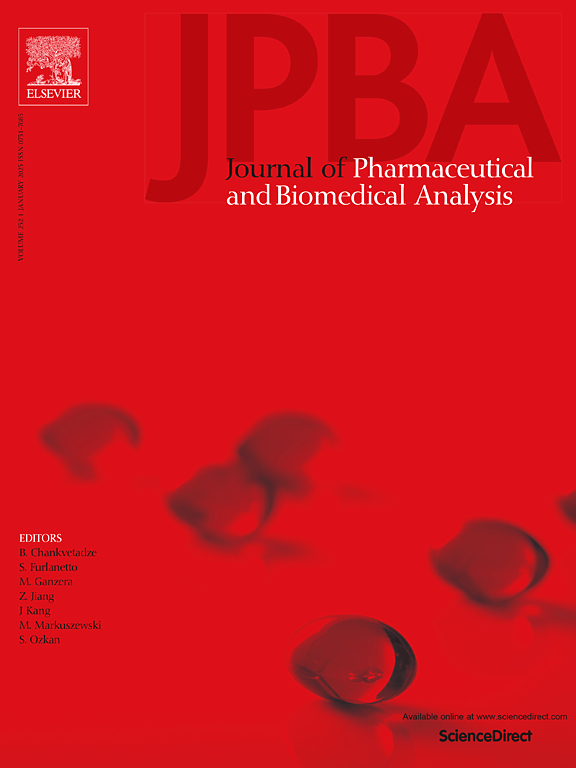基于GC-IMS和化学计量学相结合的多组分定性定量分析的炒蚕配方颗粒与传统煎剂的一致性
IF 3.1
3区 医学
Q2 CHEMISTRY, ANALYTICAL
Journal of pharmaceutical and biomedical analysis
Pub Date : 2025-05-15
DOI:10.1016/j.jpba.2025.116971
引用次数: 0
摘要
本研究以烤蚕蛹为代表,考察了炒蚕蛹颗粒剂煎剂(JC-DGD)与传统煎剂(JC-TD)的一致性。首先,采用高效液相色谱法(HPLC)建立了A、B、C、D四家厂家的JC-TD和JC-DGD的指纹图谱,并对其相似性进行了评估。两组比较差异无统计学意义(P >; 0.05)。量化五个关键指标成分,包括尿嘧啶。用考马斯亮蓝法和苯酚-硫酸法比较了粗多糖和蛋白质的含量。10批JC-TD的指标组分、蛋白质和粗多糖的平均总含量设为1。jc -DGD-省级标准(JC-DGD-PS)、jc -DGD-企业标准(JC-DGD-ES)、TD、DGD和A、B、C、d厂商DGCM不同类别指标组分含量分别为1.23、0.38、1.00、0.72、1.28、0.58、0.45和0.27。蛋白质含量分别为1.51、0.46、1.00、0.88、1.43、0.93、0.35和0.66。粗多糖含量分别为9.01、0.74、1.00、4.05、10.57、1.96、0.38和1.77。我们用GC-IMS鉴定了32种不同的挥发性有机化合物,包括胡芦巴内酯。然后用戊四唑致小鼠急性惊厥模型评价JC-TD和JC-DGD的抗惊厥作用。结果表明,JC-DGD-A >; JC-TD≈ JC-DGD-B (P >; 0.05)优于JC-DGD-C和JC-DGD-D (P <; 0.01)。最后,计算中药配方颗粒的推荐等效比。厂家A、B、C、D分别调整为1:3、1:10、1:10、1:11-1:4.54 ± 0.51、1:5.24 ± 2.22(未调整的JC-B3: 1:6 .6)、1:5.17 ± 0.49、1:3.44 ± 0.59。通过相关分析、聚类分析和多指标降维判别分析,对两者的总体、一致性进行分析。综合结果表明,JC-DGD-A的质量显著高于JC-TD,而JC-DGD-B的质量与JC-TD相近。相反,JC-DGD-C和JC-DGD-D的质量明显低于JC-TD。为提高产品质量,保证临床应用的科学合理性,生产企业必须遵守配方颗粒药的国家和省级标准。本文章由计算机程序翻译,如有差异,请以英文原文为准。
Consistency between stir-frying Bombyx Batryticatus formula granules and traditional decoctions based on multi-component qualitative and quantitative analysis combined with GC-IMS and chemometrics
This study investigates the consistency between the formula granule decoction of stir-fried Bombyx Batryticatus(JC-DGD) and its traditional decoction (JC-TD) counterpart, using roasted Bombyx Batryticatus as a representative example.First, used high-performance liquid chromatography (HPLC) to establish the fingerprints of JC-TD and JC-DGD from four manufacturers (A, B, C, and D) and assess their similarity. There was no significant difference between the two (P > 0.05).Quantified five key index components, including uracil.Compared the protein and crude polysaccharide contents using the Coomassie Brilliant Blue and phenol-sulfuric acid methods. The mean total content of index components, proteins, and crude polysaccharides in 10 batches of JC-TD was set as 1. The contents of index components in different categories - JC-DGD-provincial standard(JC-DGD-PS), JC-DGD-enterprise standard(JC-DGD-ES), TD, DGD, and DGCM from manufacturers A, B, C, and D—were 1.23, 0.38, 1.00, 0.72, 1.28, 0.58, 0.45, and 0.27, respectively. The protein contents were 1.51, 0.46, 1.00, 0.88, 1.43, 0.93, 0.35, and 0.66, respectively. The crude polysaccharide contents was 9.01, 0.74, 1.00, 4.05, 10.57, 1.96, 0.38, and 1.77, respectively. We identified 32 differential volatile organic compounds, including fenugreek lactone, using GC-IMS. Then evaluated the anticonvulsant effects of JC-TD and JC-DGD using an acute convulsion mouse model induced by pentylenetetrazole. The results showed that JC-DGD-A > JC-TD ≈ JC-DGD-B (P > 0.05)) were superior to those of JC-DGD-C and JC-DGD-D (P < 0.01). Finally, calculate the recommended equivalent ratio of Chinese medicine formula granules (DGCM). The manufacturers A, B, C, and D were adjusted from 1:3, 1:10, 1:10, and 1:11–1:4.54 ± 0.51, 1:5.24 ± 2.22 (JC-B3 without adjustment: 1:3.6), 1:5.17 ± 0.49, and 1:3.44 ± 0.59, respectively. The overall, and the consistency between the two was analyzed through correlation analysis, cluster analysis, and multi-index dimensionality reduction discriminant analysis.Comprehensive results indicated that the quality of JC-DGD-A was significantly higher than that of JC-TD, while JC-DGD-B exhibited similar quality to JC-TD. In contrast, the quality of JC-DGD-C and JC-DGD-D was significantly lower than that of JC-TD. To enhance product quality and ensure the scientific rationality of clinical applications, manufacturers must adhere to national and provincial standards for formula granule drugs.
求助全文
通过发布文献求助,成功后即可免费获取论文全文。
去求助
来源期刊
CiteScore
6.70
自引率
5.90%
发文量
588
审稿时长
37 days
期刊介绍:
This journal is an international medium directed towards the needs of academic, clinical, government and industrial analysis by publishing original research reports and critical reviews on pharmaceutical and biomedical analysis. It covers the interdisciplinary aspects of analysis in the pharmaceutical, biomedical and clinical sciences, including developments in analytical methodology, instrumentation, computation and interpretation. Submissions on novel applications focusing on drug purity and stability studies, pharmacokinetics, therapeutic monitoring, metabolic profiling; drug-related aspects of analytical biochemistry and forensic toxicology; quality assurance in the pharmaceutical industry are also welcome.
Studies from areas of well established and poorly selective methods, such as UV-VIS spectrophotometry (including derivative and multi-wavelength measurements), basic electroanalytical (potentiometric, polarographic and voltammetric) methods, fluorimetry, flow-injection analysis, etc. are accepted for publication in exceptional cases only, if a unique and substantial advantage over presently known systems is demonstrated. The same applies to the assay of simple drug formulations by any kind of methods and the determination of drugs in biological samples based merely on spiked samples. Drug purity/stability studies should contain information on the structure elucidation of the impurities/degradants.

 求助内容:
求助内容: 应助结果提醒方式:
应助结果提醒方式:


